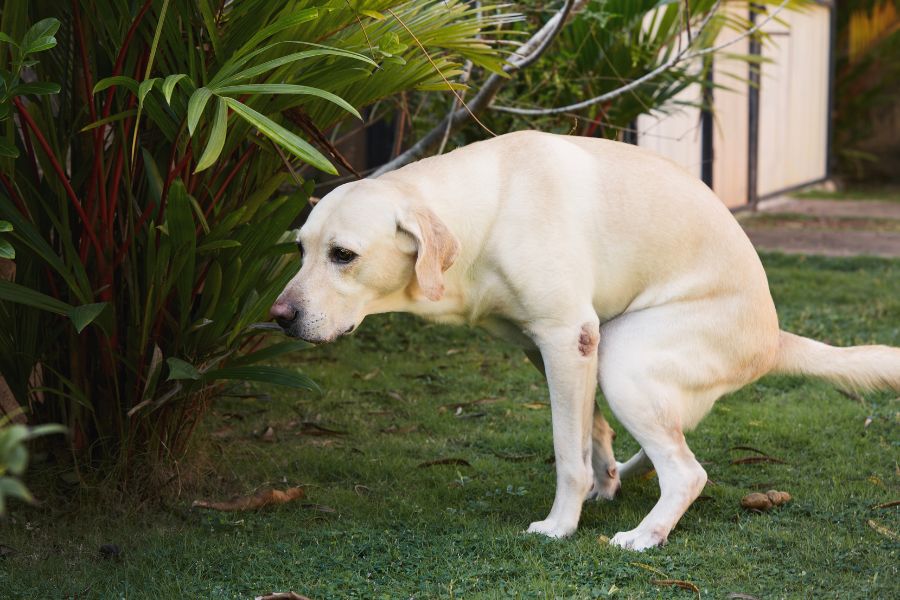How to Relieve Your Constipated Dog
Oh, the horrors of constipation! And it's not just humans who suffer from it - our furry friends can experience this too.
As a responsible dog owner, it's crucial to keep an eye out for signs of constipation and prevent it from happening in the first place.
What is constipation in dogs?
It's when your pupper has trouble pooping, or it takes a long time for them to go.
Causes of constipation in dogs can range from a lack of fiber in their diet to more serious issues like intestinal blockages.
Signs to watch out for include straining, lack of bowel movements, and uncomfortable belly bloating.
But don't worry!
I've got you covered with some simple prevention tips and easy home remedies to get your doggo's bowels moving smoothly again. Let's dive in!
Prevention is Better Than Cure
Constipation can be an uncomfortable and painful experience for dogs.
Fortunately, prevention is relatively straightforward.
Maintaining a balanced diet is essential to keep your dog's digestive system happy.
Make sure to opt for high-fiber dog food to regulate bowel movements.
Additionally, ensure your dog drinks enough water to stay hydrated and avoid constipation.
Finally, exercise your furry best friend regularly. You know how much they love to play, run, and jump—so, why not make a game out of it?
Just remember that prevention is always better than a cure!
Home Remedies to Relieve Constipation
When your dog is constipated, it can be quite distressing for him, and for you too!
Luckily, there are a number of home remedies you can try to get things flowing again.
One popular remedy is pumpkin. Yes, you heard that right: pumpkin!
Just a tablespoon or two of canned pumpkin added to your dog's food can work wonders.
Pumpkin is high in fiber, which helps to add bulk to the stool and get things moving.
Plus, most dogs love the taste of pumpkin, so it's an easy sell.
Another option to consider is olive oil. Simply add a small amount to your dog's food - just a teaspoon or so - and watch the magic happen.
Olive oil works to lubricate the digestive tract, making it easier for your dog to pass stool.
Plus, it's a healthy fat, so it's good for your dog in other ways too.
Canned food is another option you can try if your dog is struggling with constipation.
Canned food tends to be high in moisture, which can help to soften the stool and make it easier to pass.
Plus, many dogs find canned food more palatable than dry kibble, so it can be a win-win.
Finally, make sure your dog is getting enough water.
This may seem obvious, but it's important to stress.
Without enough water, stool can become hard and difficult to pass.
Make sure your dog has access to clean, fresh water at all times, and encourage him to drink regularly throughout the day.
There are a number of home remedies you can try if your dog is constipated.
Pumpkin, olive oil, canned food, and increased hydration are all good options to consider.
Just be sure to monitor your dog closely and seek veterinary care if symptoms persist.
When to Seek Veterinary Care
Despite our best efforts to alleviate constipation at home, sometimes the situation may require professional medical attention.
If your dog has not defecated despite trying different home remedies, it's time to consider seeing a veterinarian.
When Home Remedies Don't Work
When pumpkin, canned food, olive oil, or increased hydration do not help with relieving your pet’s constipation, it's time to seek veterinary care.
A veterinarian can help diagnose the problem and provide advanced treatment.
Medical and Surgical Interventions
In certain cases, your dog might require medicinal intervention such as stool softeners, laxatives, or enemas.
In severe cases, surgery may be necessary to alleviate the constipation.
How to Prepare for a Veterinary Visit
Ensure to let your vet know about your dog's detailed medical history and dietary habits.
Be prepared to answer questions about your dog's behavior and symptoms.
Bring in a sample of your dog's stool if possible.
Constipation in dogs should not be taken lightly.
Seek professional help if your dog has not defecated in more than 48 hours as it can be a sign of a more severe underlying condition.
FAQs about Constipation in Dogs
It's not unusual for dogs to skip one day of pooping, but if your furry friend hasn't relieved themselves in more than 48 hours, it's time to be concerned.
Straining during bowel movements or producing dry, hard stools can be signs of constipation in dogs.
Before you give your dog any medication, try to make some lifestyle changes by adding more fiber-rich foods to their diet, like canned pumpkin or vegetables.
Ensuring that your dog remains hydrated is also important; consider adding a bit of bone broth to their water bowl to encourage drinking.
In severe cases of constipation, veterinary intervention may be necessary.
Remember, prevention is key. Exercise your dog regularly, and be mindful of any changes in their bowel movements.
In some cases, constipation can be a sign of a more serious health problem.
If you have any concerns about your dog's health, consult your veterinarian.
Also, don't forget to clean up after your dog when you're out for a walk.
You don't want to be known as that person who leaves their dog's poop on the sidewalk.
Trust us, your neighbours will thank you!
Closing Remark
As we wrap up, remember to keep an eye out for signs of constipation in your furry friend and take necessary precautions to prevent it.
Ensure a balanced diet, hydration, and regular exercise.
If it does occur, try home remedies and consult a vet if it persists.
Stay vigilant and keep your pup healthy!

.jpeg)


Comments
Post a Comment